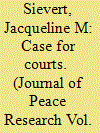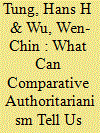| Srl | Item |
| 1 |
ID:
162457


|
|
|
|
|
| Summary/Abstract |
Authoritarian regimes are not known for adopting independent courts, yet the frequency of states empowering their judiciaries has steadily increased. In 1961 only 9% of autocracies had a partially or fully independent court, but by 1987 more than one-third of authoritarian states had reformed their judiciaries. Initiating judicial reform is risky for a regime that seeks to maintain its authority over its populace, including risks to their preferred policy positions and judgments that run contrary to the preferences of the regime. Given these risks, why do authoritarian leaders often relinquish authority to independent courts? This article argues regime leaders will choose to empower at least nominally independent courts in order to resolve information problems that lead to bargaining failures and civil war. This project uses propensity score matching to account for the complex relationship between institutional arrangement and civil war, and finds that states that adopt an independent court reduce their risk of civil war between 54% and 75% when compared to states that are equally likely to have adopted an independent court, but did not. These results suggest that leaders seeking to reduce uncertainty when bargaining with potential oppositions groups have strong incentives to implement independent judiciaries, and improve our understanding of how and why authoritarian leaders choose to delegate authority to independent judicial institutions.
|
|
|
|
|
|
|
|
|
|
|
|
|
|
|
|
| 2 |
ID:
183632


|
|
|
|
|
| Summary/Abstract |
This paper evaluates the progress and impact of the literature on comparative authoritarianism, showing not only how its development over the previous two decades can help us understand China’s authoritarian politics better, but also how the latter can move the former forward. We focus on two important topic areas in the literature: authoritarian power-sharing and autocratic politics of information (e.g., partial media freedom and government censorship). For the first topic, we shall review the literature on the authoritarian power-sharing between dictators and their allies and explicate how this conceptual innovation helps us understand the institutional foundation of China’s regime stability and phenomenal economic performance before Xi Jinping. The analysis then provides us a baseline for assessing China’s economic and political future under Xi Jinping given his clear departure from the pre-existing power-sharing framework. Finally, this paper also assesses the relevance of the literature on authoritarian politics of information to the Chinese context. In sum, we not only emphasize the conceptual contributions of the literature of comparative authoritarianism to the field of Chinese politics, but also identify lacunae in the current literature and avenues for future research that post-Xi political developments have made visible to us.
|
|
|
|
|
|
|
|
|
|
|
|
|
|
|
|